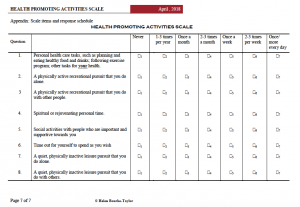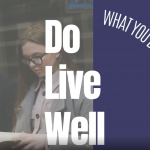Tools & Resources
DLW Tools
The tools in this section are specific to the Do Live Well model. They use the different concept of the model.
- Coping with COVID-19 Program Manual
-
New Resource Available for Download
Coping with COVID-19 Program Manual 2020
- Dimensions of Experience Worksheets
-
This series of worksheets correspond to each of the 8 Dimensions of Experience – each set includes a fillable worksheet you can use with clients, as well as a therapist guide and references.
8 Dimensions of Experience
- Activity Patterns Worksheet
-
Activity Patterns Worksheet
The Activity Patterns worksheet allows clients to reflect on how they engage in daily activities by rating 5 key characteristics of activity patterns.
- Brief Reflective Guide
-
Brief Reflective Guide
The Brief Reflective Guide was developed for people living with mood disorder. This tool is based on the concepts of the DLW model and its goal is to promote occupation in a perspective of health and well-being. The purpose of this guide is to engage the person in a discussion about his or her pattern of activity. It allows to obtain information about the client, but it’s also an exercise that enables introspection and discussion about the important aspect of the activity patterns.
- Dimension of experience group activity
-
Dimension of experience group activity
A team of occupational therapists from Montreal adapted the eight dimensions of experience of the “Do Live Well” model to create two group intervention activities with their clients living with mental health issues. Thank you to Catherine Denis, erg. for sharing her ideas and her impressions with us.
Other Tools
The tools in this section can be used in a practice based on Do Live Well.
- Community Integration Questionnaire-Revised (CIQ-R)
-
Community Integration Questionnaire-Revised (CIQ-R):
Community Integration Questionnaire-Revised (CIQ-R) is revised based on the Community Integration Questionnaire, developed by Professor Barry Willer from University of Buffalo at NY in the 1990s. The revised CIQ-R includes measurement of use of electronic social networking (ESN) for social integration. The CIQ-R can be completed directly with the person with disability or by proxy. The questionnaire has a total of 18 items across four subscales (home integration, social integration, productivity, and electronic social networking), and scores are primarily created by self-report of performance frequency. The CIQ-R and normative data manual can be found HERE.
Link with Do-Live-Well framework:
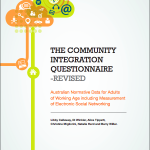
– Accessing the concept of Activity patterns (Engagement, Meaning, Balance, Choice and Control)
– Accessing concepts of Dimensions of experience (Connecting with others, Contributing to community and society, Taking care of yourself, Developing and expressing identity, Experiencing pleasure and joy)
– Accessing concept of Personal and Social Forces
- Life Balance Inventory (Matuska, K., 2012)
-
Life Balance Inventory (Matuska, K., 2012):
Link online
The Life Balance Inventory was developed to measure your life balance based on the following principles:
a) Your everyday activity patterns must enable you to meet the following important needs:
1. Have basic health and safety
2. Have rewarding and satisfying relationships
3. Have regular activities that are interesting and challenging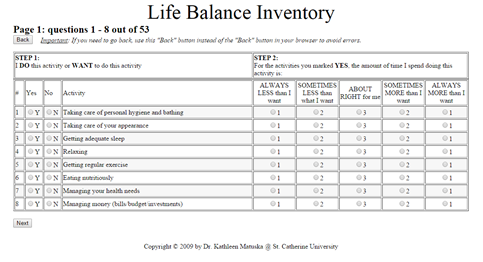
4. Have a satisfactory personal identity
b) In order to meet these needs through your activities, you also need to be able to:
5. Organize your time to meet your personal goalsLink with Do-Live-Well framework:
Accessing the concept of Balance (Activity patterns) - Model Of Human Occupation
-
Model Of Human Occupation (homepage) :
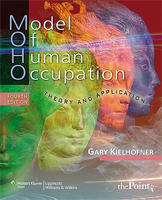
Modified Interest Checklist:
Assessment of Occupational Functioning Modified Interest Checklist: The Modified Interest Checklist gathers information on a client’s strength of interest and engagement in 68 activities in the past, currently, and in the future. The main focus is on leisure interests that influence activity choices. The checklist can be used by adolescents or adults.Link with Do-Live-Well framework:
-Accessing concepts of Activity patterns (Engagement, Meaning)
-Accessing concepts of Dimensions of experienceOccupational Questionnaire:
The Occupational Questionnaire documents an individual’s participation in occupations by half-hour intervals throughout the day. This is a shortened version of the NIH Activity record. Users classify the activity as work, play, or leisure, and record their perception of competence, value, and enjoyment for each activity. The questionnaire can be used by adolescents or adults.Link with Do-Live-Well framework:
-Accessing concepts of Activity patterns (Engagement, Meaning, Balance, Routine)
-Accessing a concept of Dimensions of experience (Experiencing pleasure and joy)
-Accessing concepts of Personal ForcesPediatric Interest Profiles:
Clients answer questions about their interest and participation in a variety of play and leisure activities. Three activity scales, the Kid Play Profile, The Preteen Play Profile, and the Adolescent Leisure Interest Profile, make this self-report/interview profile appropriate for clients ages 6-21.Link with Do-Live-Well framework:
-Accessing concepts of Activity patterns (Engagement, Meaning, Routine)
-Accessing concepts of Dimensions of experience (Connecting with others, Experiencing pleasure and joy)
-Accessing concepts of Personal and Social ForcesRole Checklist:
The Role Checklist was designed to obtain information on client’s perceptions of their participation in 10 occupational roles throughout their life. It also assesses the value they place on those occupational roles. The checklist can be used by adolescents or adults.Link with Do-Live-Well framework:
-Accessing concepts of Activity patterns (Engagement, Meaning, Balance)
-Accessing concepts of Dimensions of experience
-Accessing concepts of Personal ForcesUK Modified Interest Checklist:
The UK Modified Interest Checklist gathers information on a client’s strength of interest and engagement in 74 activities in the past, present and future. Interests are listed in nine categories that focus on different types of activity choices. The checklist can be used by adolescents or adults.Link with Do-Live-Well framework:
-Accessing a concept of Activity patterns (Meaning)
-Accessing concepts of Dimensions of experience - Engagement in Meaningful Activities Survey (EMAS)
-
Engagement in Meaningful Activities Survey (EMAS):
The Engagement in Meaningful Activities Survey (EMAS) is a 12-item survey that assesses the perceptions of one’s activities as being personally meaningful.
Engagement in Meaningful Activities Survey_17 June 2015
Engagement in Meaningful Activities Survey_May 2015
Link with Do-Live-Well framework:
-Accessing the concepts of Activity patterns (Meaning, Engagement, Choice and Control)
-Accessing concepts of Dimensions of experience - Health Promoting Activities Scale (HPAS)
-
Health Promoting Activities Scale (HPAS):
Health Promoting Activities Scale:
The Health Promoting Activities Scale (HPAS) was initially developed by Dr. Bourke-Taylor, Professor Mary Law, Associate Professors Linsey Howie and Julie Pallant to measure the participation of mothers of children with disabilities in health and leisure occupations. The times and intent of the scale is universal and relates to anyone. The HPAS is an 8-item, self-report scale that estimates a person/mother’s frequency in engaging in self-selected health-promoting activities. It enables collaboration with clients to determine their preferred and required healthy leisure participation associated with better physical, emotional, spiritual, intellectual and social health and wellbeing. More information on the psychometric evaluations of the scale and other publications can be found HERE.
Link with Do-Live-Well framework:
– Accessing the concept of Activity patterns (Engagement, Meaning, Balance, Choice and Control)
– Accessing concepts of Dimensions of experience (Connecting with others, Taking care of yourself, Developing and expressing identity, Developing capabilities and potential, Experiencing pleasure and joy)
– Accessing concept of Well-Being
- Flourishing Scale
-
Flourishing scale
Diener, E., Wirtz, D., Tov, W., Kim-Prieto, C., Choi, D., Oishi, S., & Biswas-Diener, R. (2009). New measures of well-being: Flourishing and positive and negative feelings. Social Indicators Research, 39(2), 247-266. doi:10.1007/s11205-009-9493-y
The Flourishing Scale allows a global evaluation of the general psychological functioning. It counts 8 statements with which the client may agree or disagree. It can be used with adults, young adults and teenagers.
Link with Do-Live-Well framework:
– Accessing concepts of Dimensions of experience
- POES: Profiles of Occupational Engagement in people with Schizophrenia
-
POES: Profiles of Occupational Engagement in people with Schizophrenia
POES: Ulrika Bejerholm, PhD Department of Health Sciences Division of Occupational Therapy and Gerontology Medical Faculty at Lund University, Sweden
POES was developed to gather and conclude information about occupational engagement in persons with schizophrenia. The instrument can provide the therapist with systematic data about progress and status of engagement and balance in daily occupations.
This tool can help occupational therapists to attend to and ensure that a great variety of aspects that concerns occupational engagement are considered in order to make a comprehensive evaluation and plan for intervention that supports mental health and well-being.
It consist of three parts.
Part I : data collection by means of the 24 hours yesterday time-use diary with a supplementary interview
Partie II : assessment of the information gathered in Part I and ratting of the level of occupational engagement according to nine items.
Partie III : estimation of the occupational balance according to all the collected data.
Link with Do-Live-Well framework :
-Assess activity patterns
-Considers personal and social forces.
- Occupational balance questionnaire (Larivière et al., 2023)
-
Occupational Balance Questionnaire
Larivière N, Bertrand AM, Beaudoin J, et al. Translation of the Occupational Balance Questionnaire in French and its Validation. Canadian Journal of Occupational Therapy. 2023;0(0). doi:10.1177/00084174231156288
This questionnaire assesses occupational balance, defined by the balance that an individual maintains between the various activities of daily life. This tool highlights an individual’s satisfaction with the quantity and variety of his activities. 13 items are evaluated with an ordinal scale.
Tool link: OBQ11
Link with Do-Live-Well framework :
-Assess activity patterns (Balance, Meaning, Choice/Control)
-Assesses some dimensions of experience
Books:
- Recovery Through Activity (Parkinson, S., 2014)
-
Recovery Through Activity (Parkinson, S., 2014)
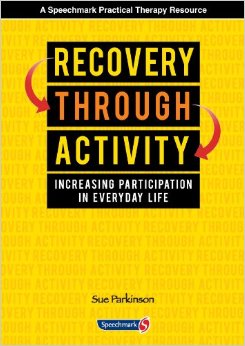 -Enables service users to recognise the long-term benefits of occupational participation by exploring the value of a range of activities-Provides occupational therapists with a valuable tool to support the use of their core skills-Provides comprehensive evidence regarding the value of activity along with a wealth of resources to support implementation of an occupation focused intervention-Helps to refocus the practice of occupational therapy in mental health on occupation-Supports occupational therapy pratitioners to engage in their core skills and enhance the quality of service user care in mental healthWorksheets:The link with the Do-Live-Well framework :-Promotion of the value of activity-Facilitating individual reflection about the impact of activity-Linking the evidence between the benefits of certain activities and health (dimensions of experience)
-Enables service users to recognise the long-term benefits of occupational participation by exploring the value of a range of activities-Provides occupational therapists with a valuable tool to support the use of their core skills-Provides comprehensive evidence regarding the value of activity along with a wealth of resources to support implementation of an occupation focused intervention-Helps to refocus the practice of occupational therapy in mental health on occupation-Supports occupational therapy pratitioners to engage in their core skills and enhance the quality of service user care in mental healthWorksheets:The link with the Do-Live-Well framework :-Promotion of the value of activity-Facilitating individual reflection about the impact of activity-Linking the evidence between the benefits of certain activities and health (dimensions of experience) - Action over inertia (Krupa, T., Edgelow, D., Radloff-Gabriel, D., Mieras, C. et al., 2010)
-
Krupa, T., Edgelow, D., Radloff-Gabriel, D., Mieras,
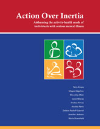 C. et al (2010). Action over inertia: Addressing the activity-health needs of individuals with serious mental illness. Ottawa: CAOT publications
C. et al (2010). Action over inertia: Addressing the activity-health needs of individuals with serious mental illness. Ottawa: CAOT publicationsAddressing the activity-health needs of individuals with serious mental illness.
Action Over Inertia introduces readers to an occupational time-use intervention that aims to re-engage community dwelling individuals with serious mental illness with meaningful activity, positively influencing levels of occupational balance and engagement.
Included in the publication are step-by-step instructions, worksheets and resources to use directly with individuals and groups.
Worksheets :
AOI_Worksheet1_1
Evaluating current activity patterns (service provider)Link with Do-Live-Well framework:
-Accessing concepts of Activity patterns (Balance, Routine, Meaning)
-Accessing concepts of Dimensions of experience (Connecting with others, Experiencing pleasure and joy)
-Accessing concepts of Personal and Social ForcesAOI_Worksheet 2_6
Finding meaning in my activities
Link with Do-Live-Well framework:
-Accessing a concept of Activity patterns (Meaning)AOI_Worksheet 2_8
Social interaction through activities
Link with Do-Live-Well framework:
-Accessing a concept of Activity patterns (Routine)
-Accessing a concept of Dimensions of experience (Connecting with others)
-Accessing concepts of Social Forces - Model Of Human Occupation: Theory and application (4th ed.) (Kielhofner, G., 2008)
-
Kielhofner, G. (2008) Model of human occupation:

Theory and application (4th ed.). Philadelphia: Lippincott, Williams & Wilkins.
Applications:
Publications:
Hamilton KA, Letts LJ, Larivière N, Moll SE. Revisiting the Do-Live-Well Health Promotion Framework: A Citation Content Analysis. Can J Occup Ther. 2023 Jan 9:84174221149268. doi: 10.1177/00084174221149268.
Mancuso, M., Guo, R., Kim, S., Letts, L. (2022). Do Live Well for student occupational therapists: A workshop experience. OT Now, November 2022 (vol 25.6), 10-12.
Kim, S., Gewurtz, R., Bayer, I., Larivière, N., Letts, L. (2021). The Development of Theory- and Evidence based Educational Workshops for Occupational Therapists. Journal of Occupational Therapy Education. 5(3): 1-16.
Kim, S., Larivière, N., Bayer, I., Gewurtz, R., Letts, L. (2021). Occupational therapists’ application of the Do-Live-Well framework: A Canadian health promotion approach. Canadian Journal of Occupational Therapy. 0: 0.
Kim, S., Larivière, N., Gewurtz, R., Bayer, I., Letts, L. (2021). Comparing Online and In-person Educational Workshops for Canadian Occupational Therapists and Understanding Their Learning Experiences: A Mixed-Methods Study. Journal of Medical Internet Research Medical Education. 0: 0.
Moll, S., Gewurtz, R., Krupa, T., Law, M. Lariviere, N., Levasseur, M. (2015) “Do-Live-Well”: A Canadian framework for promoting occupation, health and well-being, Canadian Journal of Occupational Therapy, 82(1), 9-23. http://cjo.sagepub.com/content/early/2014/08/20/0008417414545981
Moll S. E., Gewurtz R. E., Krupa, T. M., & Law, M. C. (2013). Promoting an occupational perspective in public health. Canadian Journal of Occupational Therapy, 80, 111-119. http://cjo.sagepub.com/content/80/2/111.abstract
Moll, S., Gewurtz, R., Krupa, T. & Law, M. (2012). Strategic Leadership: Towards development of a National Activity Guide. OT Now, 14(4), 19-20.
-
Ruth Ryse
-
Dolive Well
-
 English
English Français
Français

